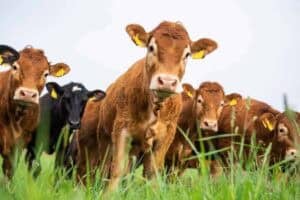Authorities continue to monitor foot-and-mouth disease in KwaZulu-Natal and the Eastern Cape, warning that failure to contain it could hurt SA’s meat exports.

Farmers have been urged to adhere to quarantine measures to prevent the spread of foot-and-mouth disease (FMD) that remains unresolved after it was reported last month.
This is the view of TLU SA chair Bennie van Zyl in his reaction to news that the outbreak remains unresolved in KwaZulu-Natal and the Eastern Cape.
“We request that all role players stick to the quarantine measures and avoid transporting livestock to the affected areas, so that the spreading of the disease can be contained,” said Van Zyl.
Foot-and-mouth outbreak unresolved in KZN and EC
“If the outbreak becomes broader than what we are experiencing now, it will negatively affect the country’s meat exports.”
Department of agriculture spokesperson Joylene van Wyk confirmed that the outbreak persisted in the two provinces.
ALSO READ: Suspected outbreak of hand, foot, and mouth disease at Bloem daycare sparks urgent response
“The World Organisation for Animal Health has officially declared FMD outbreaks in all other previously affected provinces as resolved and closed,” said Van Wyk.
Even though the outbreak remained unresolved, she said there had been no new reported cases in the past four months.
Van Wyk said the disease management area (DMA) remained in place and extensive surveillance was being conducted to ensure that no undetected pockets of infection persisted.
Surveilance results favourable
She said should the surveillance results be favourable; the minister would consider lifting the DMA restrictions.
According to Van Wyk, there were 73 affected farms in the Kouga and Kou-Kamma municipalities in the Eastern Cape, where animals were either infected or pre-emptively vaccinated.
ALSO READ: At least 24 farms under foot and mouth quarantine in Eastern Cape
“The affected farms remain under quarantine, with strict movement controls and monitoring in place for at least the next 12 months.
“Surveillance will be conducted thereafter to confirm the absence of viral resurgence. Farmers are urged to continue adhering to strict biosecurity measures to prevent a recurrence of the disease.”
In KwaZulu-Natal the affected areas included Pongola and Mtubatuba, where affected dip tanks remained under quarantine, and cattle in adjacent dip tanks had been vaccinated to bolster herd immunity in the region.
Affected farms
Van Wyk could not give the number of farms affected in KwaZulu-Natal.
Wandile Sihlobo, an agricultural economist, lauded the efforts to control the spread of the animal disease.
ALSO READ: Eastern Cape farms in quarantine after outbreak of foot-and-mouth disease
“The past three years have been challenging for South Africa’s livestock and poultry industry because of the spread of animal diseases.
“Throughout this period, we have had various cases of FMD disease in cattle, African swine fever in pigs and avian influenza in poultry.
“While animal disease outbreaks are not unique to South Africa and are common across the world, South Africa’s challenges have intensified in the recent past,” said Sihlobo.
Reduced exports to world market
He said the cost of diseases in the livestock industry was not only felt through the loss of livestock, but also through reduced exports to the world market.
Sihlobo said if not addressed, FMD could harm the country’s beef exports like it did in 2022 by 16% year-on-year to 26 881 tonnes.
ALSO READ: Foot and mouth grips part of SA, but does it affect humans?
“This decline was primarily due to the temporary closures of various export markets following the outbreak of the FMD disease. The sheep industry was also affected by the 2022 outbreak.
Beef exports recovered slightly in 2023, up 3% year-on-year to 27 675 tons.”






